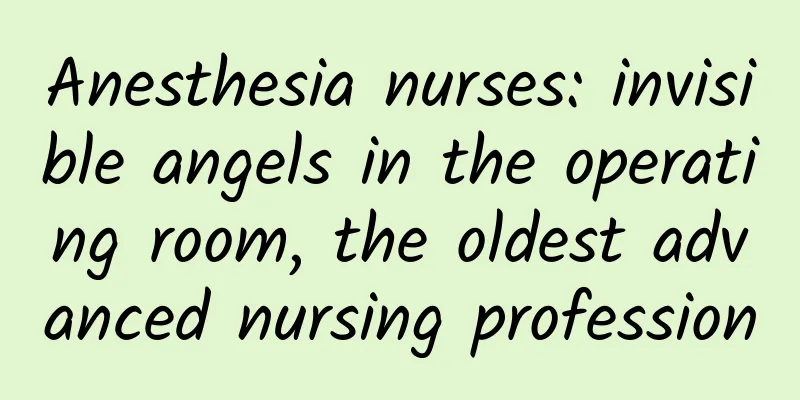Anesthesia nurses: invisible angels in the operating room, the oldest advanced nursing profession

|
For many people, the operating room is a mysterious and scary place, with a cold door separating anxious family members from fragile lives. Perhaps, you more or less know that in the operating room, there are surgeons who "perform operations", anesthesiologists who "save lives", and "operating room nurses" who cooperate with the doctors. But few people know about this group of heroes behind the scenes - anesthesia nurses. In fact, nurse anesthetists are recognized as the oldest advanced nursing profession. 1861 In response to the growing need among surgeons for trained anesthesiologists who could safely administer anesthesia, anesthesia specialist nurses have emerged internationally. 1880s Because nurses are particularly good at observing the condition of the patient, judging clinical symptoms, and caring for patients during surgery, anesthesia nurses have become a recognized field in the nursing profession. 1931 As one of the countries with the most mature development of anesthesia nursing, the United States established the American Association of Nurse Anesthetists (AANA) and officially published the Nurse Anesthetists magazine. 1945 The certification process for nurse anesthetists was implemented, and its accreditation process was implemented in 1952. Thus, anesthesia nursing became a legitimate, unique profession with a formal certification and accreditation process. 1993 The Department of Anesthesiology of Xuzhou Medical College and Nanjing Liuhe Medical School jointly opened the first three-year anesthesia and emergency nursing major (secondary technical school) in my country. 2004 Xuzhou Medical College was the first in the country to establish the "Nursing and Anesthesia Nurse Specialty" (undergraduate), relying on its nationally renowned Department of Anesthesiology to provide the country with high-quality anesthesia specialist nurse talents. March 2009 At the 7th National Academic Exchange Conference on Anesthesia and Resuscitation Progress (Guangzhou), the Higher Anesthesiology Education Research Association formally established the Anesthesia Specialist Nurse Qualification Training Advisory Committee based on expert consensus, and determined that the focus of work is to develop a continuing education model (contineuse medical education CME) and conduct qualification training and certification. This is a milestone in the development of anesthesia specialist nurse education. December 2017 The National Health and Family Planning Commission has clearly stated that medical institutions with conditions should set up anesthesia nursing units to strengthen nursing services for anesthetized patients. It is necessary to carefully sort out the relevant processes of anesthesia medical care and nursing services, clarify the responsibilities of anesthesia nursing work, improve the professional level of anesthesia medical care and nursing services, and ensure that anesthesiologists have sufficient time and energy to provide anesthesia medical services to patients. August 2018 The National Health Commission and seven other departments jointly issued the "Notice on Issuing Opinions on Strengthening and Improving Anesthesia Medical Services" (Guo Wei Yi Fa <2018> No. 21), which clearly requires the establishment of additional auxiliary personnel positions such as anesthesia nurses and technicians, and that anesthesia departments in medical institutions at or above the second level be equipped with anesthesia nurses. Why do we need nurse anesthetists? Anesthesiologists in many hospitals have to prepare equipment and medicines during anesthesia, emergency treatment and resuscitation, perform anesthetic operations and monitor and treat patients at the same time. This traditional role of "doctor, technician and nurse" seriously interferes with the management efficiency and quality of anesthesiologists, and may even affect the perioperative safety of patients. It also violates the development law of modern medicine that is increasingly specialized and divided into different tasks. In addition, with the impact of new surgical technologies, new projects, new operations and an aging society, the patients treated in hospitals are becoming more critical, complex and changeable, which requires anesthesiologists to have a high level of professional skills. At the same time, the cooperation of professional anesthesia nurses is also required. What tasks do an anesthetist perform? 1) Anesthesia Induction Room: Responsible for the preparation of pre-anesthetic drugs, supplies, instruments and equipment; implement pre-anesthetic education; confirm patient information and verify the surgical site with the surgeon and operating room nurse; follow the anesthesiologist's instructions to correctly draw drugs and assist in completing anesthesia induction; monitor and record the patient's condition during induction, and cooperate with the doctor for rescue when necessary. 2) Postanesthesia Care Unit (PACU): Under the guidance of the anesthesiologist, PACU is responsible for monitoring, managing and recording the condition of patients during the anesthesia recovery period, ensuring that patients pass through the recovery period smoothly and are safely escorted to the ward. 3) Patient Controlled Analgesia (PCA) configuration and postoperative analgesia follow-up. Correctly configure the PCA pump according to the anesthesiologist's instructions, correctly connect and start the PCA before the end of the patient's surgery, and implement PCA follow-up according to PCA management specifications to ensure analgesic effect. 4) Anesthesia care outside the operating room: cooperate with the anesthesiologist to implement painless examinations such as gastrointestinal endoscopy and fiberoptic bronchoscopy, painless abortion, interventional anesthesia, etc., and manage patients during the anesthesia recovery period, etc. Anesthesia nursing is a profession. Anesthesia nurses are experts like anesthesiologists. These two experts (anesthesiologists and anesthesia nurses) have been highly respected in health care services. If it were not for the high-quality anesthesia nurses to provide services over the years, anesthesiologists would not have made so many contributions in research. In fact, anesthesia nursing has become an indispensable profession for the development of medicine, and anesthesia nurses have also become an irreplaceable role in medical service activities. With the development of the times, anesthesia nurses will perform more and more wonderful lives! |
Recommend
Does bloody vaginal discharge indicate cervical erosion?
The appearance of a small amount of blood in leuc...
What are the main methods for preventing breast cancer?
The prevention of breast tumors is an issue that ...
Surprise! Forehead wrinkles are related to cardiovascular disease?
Have you ever looked in the mirror and suddenly f...
Can I drink monk fruit tea during menstruation?
Girls have their menstrual period every month. Th...
What are the symptoms of dampness in a woman's body?
Dampness is usually said to be the root of all di...
Do you know the 4 secret benefits of chickpeas? But these 4 types of people should not eat them casually!
Xiao Zhang is a young man who loves fitness. He o...
These four foods are excellent for nourishing yin and tonifying the kidneys!
Under the influence of some pressure, more and mo...
What kind of leaders use violence against honest people? How can we avoid being attacked by leaders?
Honest people usually do things in a down-to-eart...
The body temperature drops on the tenth day after ovulation
For couples who are anxious to have a child, they...
Will the NT value at 13 weeks be higher than that at 11 weeks?
During the whole process of women's pregnancy...
What causes breast discomfort?
Mastopathy is a very common breast disease, and t...
What is the reason for less menstrual flow after abortion?
After a woman becomes pregnant, she may suffer fr...
A woman with a mole on her left ear
Everyone has black moles on their body. If they g...









